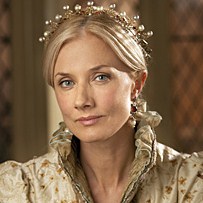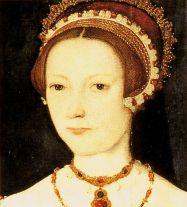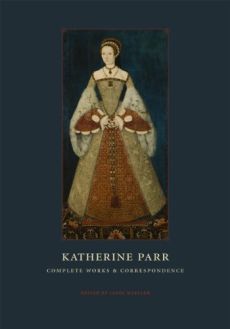Catherine Parr in her own words
Jump to navigation
Jump to search
 | Letters of Catherine Parr |  |
| "Although the distance of time and account of days neither is long nor many of your majesty's absence, yet the want of your presence, so much desired and beloved by me, maketh me that I cannot quietly pleasure in anything until I hear from your majesty. The time, therefore, seemeth to me very long, with a great desire to know how your highness hath done since your departing hence, whose prosperity and health I prefer and desire more than mine own. And whereas I know your majesty's absence is never without great need, yet love and affection compel me to desire your presence. Again, the same zeal and affection force me to be best content with that which is your will and pleasure. Thus love maketh me in all things to set apart mine own convenience and pleasure, and to embrace most joyfully his will and pleasure whom I love. God, the knower of secrets, can judge these words not to be written only with ink, but most truly impressed on the heart. Much more I omit, lest it be thought I go about to praise myself, or crave a thank; which thing to do I mind nothing less, but a plain, simple relation of the love and zeal I bear your majesty, proceeding from the abundance of the heart. Wherein I must confess I desire no commendation, having such just occasion to do the same. I make like account with your majesty as I do with God for his benefits and gifts heaped upon me daily, acknowledging myself a great debtor to him, not being able to recompense the least of his benefits; in which state I am certain and sure to die, yet I hope in His gracious acceptation of my goodwill. Even such confidence have I in your majesty's gentleness, knowing myself never to have done my duty as were requisite and meet for such a noble prince, at whose hands I have found and received so much love and goodness, that with words I cannot express it. Lest I should be too tedious to your majesty, I finish this my scribbled letter, committing you to the governance of the Lord with long and prosperous life here, and after this life to enjoy the kingdom of his elect. From Greenwich, by your majesty's humble and obedient servant, Katharine the Queen." [written to her husband while she was Queen Regnant during King Henry VIII's six-week absence as he attended the siege of Boulogne in 1544] |
| "Katharine the Queen. Right trusty and well-beloved cousins, we greet you well. Letting you wit that having received your letters of the 23rd of this present, we have by the same had singular comfort, as well to perceive thereby the state of health my lord the king's majesty was in at that present, as also the good beginning of success of his grace's affairs there; for your joyful news whereof we give unto you our right hearty thanks. And forasmuch as, touching the other contents of your said letters, we have presently written at length unto my said lord, the king's majesty, we forbear to repeat the same unto you, not doubting but that his highness will communicate the same unto you accordingly. Given under our signet at my said lord the king's majesty's honor of Hampton Court, the 25th day of July, the 36th year of his majesty's most noble reign." [written to the Privy Council in 1544] |
| "Although, most noble and dearest lady, there are many reasons that easily induce my writing to you at this time, yet nothing so greatly moves me thereto as my concern for your health; which, as I hope it is very good, so am I greatly desirous to be assured thereof. Wherefor, I despatch to you this messenger, who will be (I judge) most acceptable to you, not only from his skill in music, in which you, I am well aware, take as much delight as myself, but also because, having long sojourned with me, he can give the most certain information of my whole estate and health. And, in truth, I have had it in mind before this to have made a journey to you and salute you in person; but all things do not correspond with my will. Now, however, I hope this winter, and that ere long, that, being nearer, we shall meet; than which, I assure you, nothing can be to me more agreeable, and more to my heart's desire. Now since, as I have heard, the finishing touch (as far as the translation is concerned) is given by Mallet to Erasmus's work upon John, and nought now remains but that proper care and vigilance should be taken in revising, I entreat you to send over to me this very excellent and useful work, now amended by Mallet, or some of your people, that it may be committed to the press in due time; and farther, to signify whether you wish it to go forth to the world (most auspiciously) under your name, or as the production of an unknown writer. To which work you will, in my opinion, do a real injury, if you refuse to let it go down to posterity under the auspices of your own name, since you have undertaken so much labor in accurately translating it for the great good of the public, and would have undertaken still greater (as is well known) if the health of your body had permitted. And, since all the world knows that you have toiled and labored much in this business, I do not see why you should repudiate that praise which all men justly confer on you. However, I leave this whole matter to your discretion and, whatever resolution you may adopt, that will meet my fullest approbation. For the purse, which you have sent me as a present, I return you great thanks. I pray God, the greatest and best of beings, that He deign to bless you uninterruptedly with true and unalloyed happiness. May you long fare well in him. From Hanworth, 20th of September, Most devotedly and lovingly yours, Katharine the Queen." [written to Princess Mary Tudor in 1544] |
 <a class="external" href="http://astore.amazon.com/onthetudtra-20/detail/0226647242" rel="nofollow" target="_blank">Katherine Parr: Complete Works and Correspondences </a> <a class="external" href="http://astore.amazon.com/onthetudtra-20/detail/0226647242" rel="nofollow" target="_blank">Katherine Parr: Complete Works and Correspondences </a>“There has been no full annotated edition of Katherine Parr’s works before and it is high time that we had one. This new edition is a huge accomplishment, and many scholars, from those interested in women’s studies to those exploring Tudor politics to religious historians, will want to consult it.”—Anne Lake Prescott, Barnard College, Columbia University |